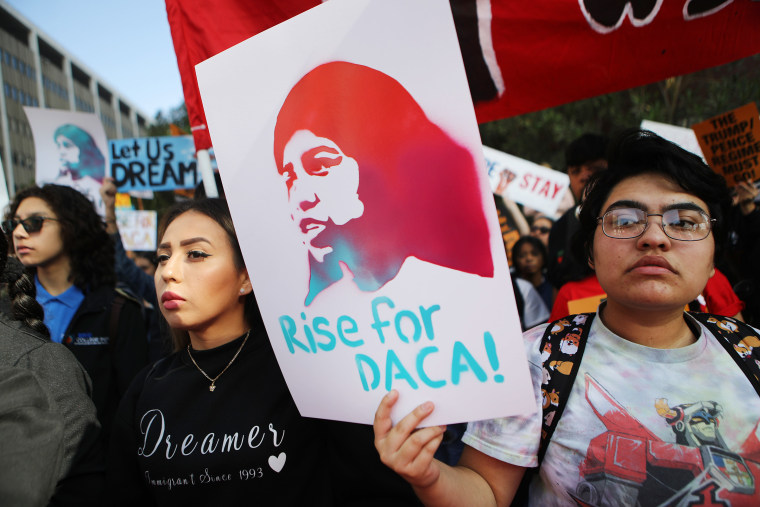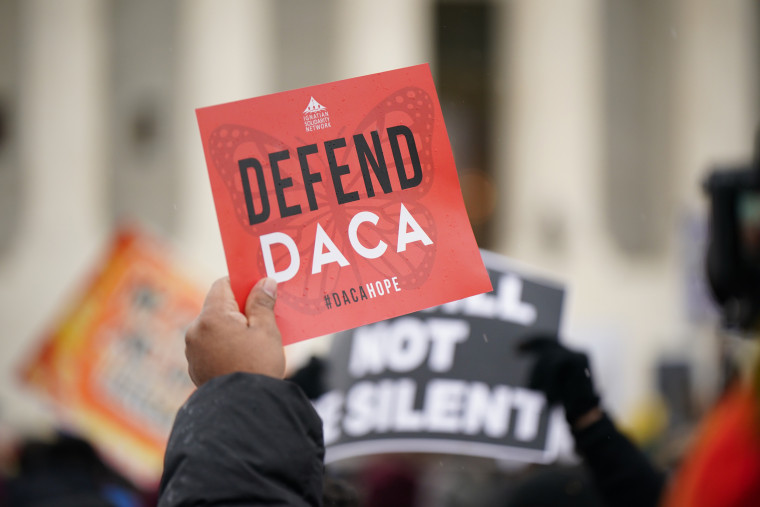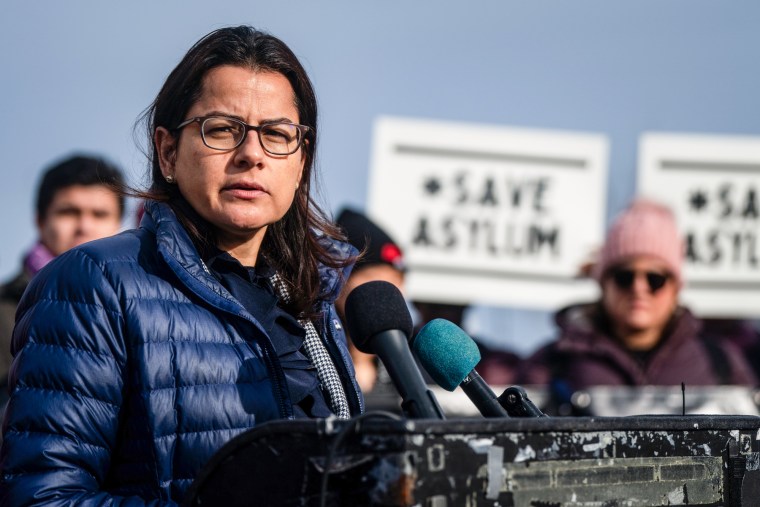People rally outside the Supreme Court over President Trump’s decision to end the Deferred Action for Childhood Arrivals program (DACA), at the Supreme Court in Washington, Nov. 12, 2019. A federal judge on Wednesday, Sept. 13, 2023, declared illegal a revised version of a federal policy that prevents the deportation of hundreds of thousands of immigrants brought to the U.S. as children. (AP Photo/Jacquelyn Martin, File)
Susana Lujano, left, a dreamer from Mexico who lives in Houston, joins other activists to rally in support of the Deferred Action for Childhood Arrivals program, also known as DACA, at the Capitol in Washington, Wednesday, June 15, 2022. A federal judge on Wednesday, Sept. 13, 2023, declared illegal a revised version of a federal policy that prevents the deportation of hundreds of thousands of immigrants brought to the U.S. as children. (AP Photo/J. Scott Applewhite, File)
Deferred Action for Childhood Arrivals (DACA) students gather in front of the Supreme Court in Washington, June 18, 2020. A federal judge on Wednesday, Sept. 13, 2023, declared illegal a revised version of a federal policy that prevents the deportation of hundreds of thousands of immigrants brought to the U.S. as children.
BY JUAN A. LOZANO
September 13, 2023
HOUSTON (AP) — While a federal judge on Wednesday declared illegal a revised version of a federal policy that prevents the deportation of hundreds of thousands of immigrants brought to the U.S. as children, he declined to order an immediate end to the program and the protections it offers to recipients.
U.S. District Judge Andrew Hanen agreed with Texas and eight other states suing to stop the Deferred Action for Childhood Arrivals, or DACA, program. The judge’s ruling was ultimately expected to be appealed to the U.S. Supreme Court, sending the program’s fate before the high court for a third time.
“While sympathetic to the predicament of DACA recipients and their families, this Court has expressed its concerns about the legality of the program for some time,” Hanen wrote in his 40-page ruling. “The solution for these deficiencies lies with the legislature, not the executive or judicial branches. Congress, for any number of reasons, has decided not to pass DACA-like legislation ... The Executive Branch cannot usurp the power bestowed on Congress by the Constitution — even to fill a void.”
Hanen’s order extended the current injunction that had been in place against DACA, which barred the government from approving any new applications, but left the program intact for existing recipients during the ongoing legal review.
Hanen also declined a request by the states to order the program’s end within two years. Hanen said his order does not require the federal government to take any actions against DACA recipients, who are known as “Dreamers.”
Thomas Saenz, president and general counsel of the Mexican American Legal Defense and Educational Fund, or MALDEF, which is representing DACA recipients in the lawsuit, said it will ultimately be up to higher courts, including the Supreme Court, to rule on DACA’s legality and whether Texas proved it had been harmed by the program.
“Judge Hanen has consistently erred in resolving both of these issues, and today’s ruling is more of the same flawed analysis. We look forward to continuing to defend the lawful and much-needed DACA program on review in higher courts,” Saenz said.
The Biden administration criticized the judge’s ruling.
“We are deeply disappointed in today’s DACA ruling from the District Court in Southern Texas,” press secretary Karine Jean-Pierre said in a statement Wednesday night. “... As we have long maintained, we disagree with the District Court’s conclusion that DACA is unlawful, and will continue to defend this critical policy from legal challenges. While we do so, consistent with the court’s order, DHS will continue to process renewals for current DACA recipients and DHS (the Department of Homeland Security) may continue to accept DACA applications.”
The Texas Attorney General’s Office, which represented the states in the lawsuit, and the U.S. Department of Justice, which represented the federal government, didn’t immediately return emails or calls seeking comment.
The states have argued the Obama administration didn’t have the authority to first create the program in 2012 because it circumvented Congress.
In 2021, Hanen had declared the program illegal, ruling it had not been subject to public notice and comment periods required under the federal Administrative Procedures Act.
The Biden administration tried to satisfy Hanen’s concerns with a new version of DACA that took effect in October 2022 and was subject to public comments as part of a formal rule-making process.
But Hanen, who was appointed by then-President George W. Bush in 2002, ruled the updated version of DACA was still illegal as the Biden administration’s new version was essentially the same as the old version, started under the Obama administration. Hanen had previously said DACA was unconstitutional.
Hanen also had previously ruled the states had standing to file their lawsuit because they had been harmed by the program.
The states have claimed they incur hundreds of millions of dollars in health care, education and other costs when immigrants are allowed to remain in the country illegally. The states that sued are Texas, Alabama, Arkansas, Louisiana, Nebraska, South Carolina, West Virginia, Kansas and Mississippi.
Those defending the program — the federal government, the Mexican American Legal Defense and Educational Fund and the state of New Jersey — had argued the states failed to present evidence that any of the costs they allege they have incurred have been tied to DACA recipients. They also argued Congress has given the Department of Homeland Security the legal authority to set immigration enforcement policies.
There were 578,680 people enrolled in DACA at the end of March, according to U.S. Citizenship and Immigration Services.
The program has faced a roller coaster of court challenges over the years.
In 2016, the Supreme Court deadlocked 4-4 over an expanded DACA and a version of the program for parents of DACA recipients. In 2020, the high court ruled 5-4 that the Trump administration improperly ended DACA, allowing it to stay in place.
In 2022, the 5th U.S. Circuit Court of Appeals in New Orleans upheld Hanen’s earlier ruling declaring DACA illegal, but sent the case back to him to review changes made to the program by the Biden administration.
President Joe Biden and advocacy groups have called on Congress to pass permanent protections for “ dreamers.” Congress has failed multiple times to pass proposals called the DREAM Act to protect DACA recipients.
“We continue to urge Congress and President Biden to create permanent solutions for all immigrants to ensure none are left in the perilous road DACA has been on for the past decade,” Veronica Garcia, an attorney with the Immigrant Legal Resource Center, an advocacy organization, said in a statement.
___
Follow Juan A. Lozano on X, the platform formerly known as Twitter: https://twitter.com/juanlozano70









